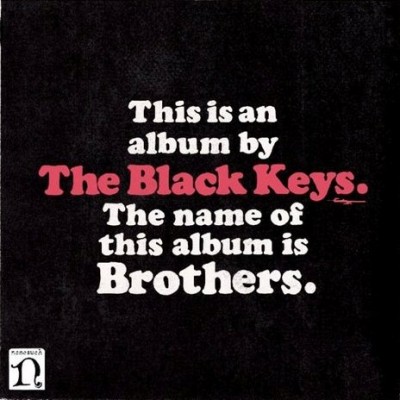 In the August heat of 2009, The Black Keys left a Brooklyn studio—where they’d been working with an all-star posse of MCs—for 10 days in creative isolation at the historic Muscle Shoals studio in Alabama. Their geographical trek mirrored a musical journey, from contemporary hip-hop jams to the hallowed ground of classic R&B, that has resulted in the most cohesive album—and the deepest, steamiest grooves—of the duo’s eight-year career. These sessions yielded tunes that have the instantaneous, gotta-hear-it-again pull of a vintage 45; leadoff track “Everlasting Light” sounds like something Marc Bolan of T-Rex might have cut if he’d been signed to Stax. But more than just genre- and decade-hopping fun, there’s an emotional candor and narrative quality to the songs that offer a whole new level of soulfulness to the already floorboards-shaking sound of The Black Keys.
In the August heat of 2009, The Black Keys left a Brooklyn studio—where they’d been working with an all-star posse of MCs—for 10 days in creative isolation at the historic Muscle Shoals studio in Alabama. Their geographical trek mirrored a musical journey, from contemporary hip-hop jams to the hallowed ground of classic R&B, that has resulted in the most cohesive album—and the deepest, steamiest grooves—of the duo’s eight-year career. These sessions yielded tunes that have the instantaneous, gotta-hear-it-again pull of a vintage 45; leadoff track “Everlasting Light” sounds like something Marc Bolan of T-Rex might have cut if he’d been signed to Stax. But more than just genre- and decade-hopping fun, there’s an emotional candor and narrative quality to the songs that offer a whole new level of soulfulness to the already floorboards-shaking sound of The Black Keys.
Brothers is, in many ways, the culmination of a tumultuous period for Auerbach and Carney as they juggled personal challenges with creative opportunities. For the first time in a career of non-stop touring and recording, Auerbach and Carney embarked on projects of their own, on top of their dates for The Black Keys. Auerbach made his solo debut, Keep It Hid, and hit the road with a full band; Carney picked up the bass for his own combo, Drummer, comprising five notable Ohioan drummers, only one of whom actually sits behind the kit on their disc, Feel Good Together.
Brothers is more stripped down than Attack & Release, the 2008 album they cut mostly in a vintage studio outside Cleveland with producer Danger Mouse and several guest players. Danger Mouse returned to produce “Tighten Up,” but there are no additional musicians, save for Atlanta-based R&B belter Nicole Wray, a former Missy Elliot protégé who contributes backing vocals to “Everlasting Light,” “Next Girl,” and “Howlin’ For You.” Yet the sound of Brothers feels like another huge step forward. The Black Keys rely on less yet ingeniously achieve more.
Grammy Award–winning engineer-auteur Tchad Blake mixed the album and totally got the concept. Auerbach describes him as “a genius with audio, a complete wizard, because we recorded these songs in a really minimal way. There are no more than 11 or 12 tracks on one song. All the drums are on one or two tracks, which is sort of unheard of in the modern-day recording world. Tchad does a lot of mixing where I’m sure he gets, you know, 40 or 50 tracks on one song. So he was really excited about our record, he would call us up and just tell us how much fun it is to mix this stuff because it was so raw.” For Carney, as he told Rolling Stone, bringing in Blake at the end underscored the attitude and the aim of Brothers: “He approaches mixing in the same way we approach making music. Respecting the past while being in the present.”





